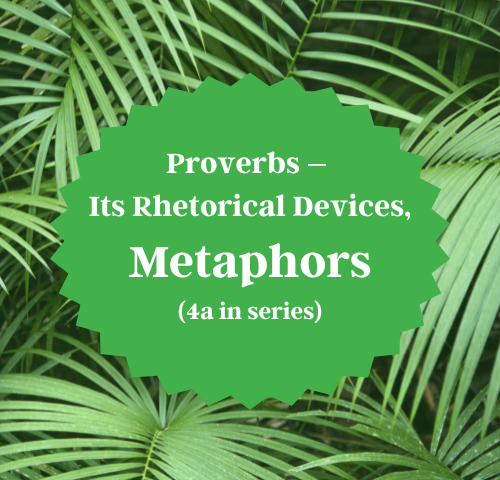Live Miracle Service
April 29, 2023Es de aquí que el poder de Dios nos alcanza
May 5, 2023PROVERBS: GPS to a Better Life
Blog Series #4a: Proverbs – Its Rhetorical Devices
Metaphors!
“Metaphors are the spice that adds flavor to the blandness of language.”
– Loretta Huggins
Metaphors have been a powerful literary tool since time immemorial to describe one thing in terms of another thing. Metaphors add depth and meaning to language. They function to simplify complex ideas in relatable ways. The Book of Proverbs is a perfect example of this, as it is replete with metaphors that add literary flavor to what may appear to readers as a mundane list of Do-s and Don’t-s. In this blog, we explore the metaphors found in the Book of Proverbs and demonstrate how they convey wisdom and instructions with an imaginative flair. To loosely quote myself, “Metaphors are like spices that add flavor to otherwise dull language,” and the metaphors found in Proverbs serve as an excellent example of this pithy saying.
One of the most recognized metaphors in the Book of Proverbs is found in chapter 3, where wisdom is compared to a tree. Verse 18 reads, “She is a tree of life to those who lay hold of her; those who hold her fast are called blessed.” This metaphor describes the importance of seeking and holding onto wisdom. I love this verse because of the image of hugging a tree. At times I have jokingly (yet, truthfully) said to others, “Yes, I am from California – I’m a tree-hugger,” knowing that a tree-hugger is someone regarded as foolish or annoying because of being too concerned about protecting trees, animals, and other parts of our natural world from pollution and toxic threats. Unfortunately, there are those – environmentalists or conservationists – who have taken their cause a bit too far, resulting in us “normal” tree-huggers being tainted with the same disdain brush.
Yet, the above passage from Proverbs instructs us to take hold of wisdom as if it is a sturdy tree and never let go. (YAY for tree-hugging!) Have you ever considered the benefits of healthy trees? Here are a few examples of how beneficial a tree can be in our everyday living (Resources):
- Trees can reduce stressful noises by 50%: A row of trees can create a dense buffer to help with noise control.
- Trees decrease mental stress: Just a quiet walk in a park, forest, or nature area can create “a rest period” for an overactive mind.
- Trees help students: Studies have shown that students are more able to concentrate when they have regular access to green spaces.
- Trees keep the air clean: Did you know trees reduce evaporative emissions of volatile organic compounds (VOCs) from parked cars? Ground-level ozone, which is formed by VOCs), makes it difficult to breathe – especially for those who are asthmatic.
- Tree-lined streets can encourage walking or other forms of exercise, thus, helping to lower heart disease, stroke, and even some forms of cancer.
- Trees are a source of healthy foods: Apples, peaches, oranges, and so forth.
Well, there are many more health benefits of trees. Perhaps that is why King Solomon instructed us to treat wisdom as if it were a tree of life: “…wisdom is the healing tree of life…,” (TPT). A healthy tree provides nourishment and shade. Wisdom provides stability and sustenance for the soul.
Next week’s Blog: Continuation of Metaphors
Questions for discussion:
- How is comparing wisdom to a tree significant in modern life?
- What are your thoughts on my comments on “tree-hugging”? Do you think it relates to the metaphor in the Book of Proverbs?
Works Cited
Resources, MN Department of Natural. Health Benefits of Trees. 2023. Minnesota DNR. <https://www.dnr.state.mn.us/trees/health-benefits-trees.html>.

Loretta Huggins, born and raised in San Francisco, CA, has served in the ministry with her husband, Larry Huggins since 1989: administrator, hostess, event planner, and teacher. She has traveled to eighteen countries. She is the co-founder and co-pastor of ZChurch.




